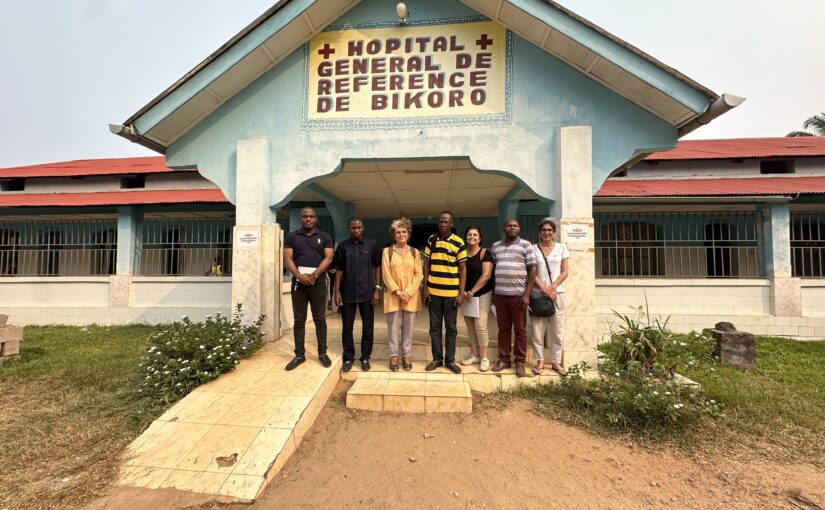Treating mpox in Africa: MOSA begins Patient enrollment in DRC

The MpOx Study in Africa or MOSA has just started, with the first patients randomized at the Mbandaka Hospital in the Equateur Province of the Democratic Republic of the Congo (DRC). Sponsored by our partner PANTHER with Africa CDC as a key research partner, MOSA is a pivotal clinical trial designed to advance research into mpox treatments across the continent. It is a major milestone in the fight against mpox across Africa and a great contribution to the global research effort!
African context in 2024 for mpox : what results ?
The current upsurge of mpox in Africa underscores the need for a coordinated global effort. The Africa Centres for Disease Control and Prevention (Africa CDC) has reported nearly 70 000 cases and 1268 deaths from the beginning of 2024 to the end of December. 1 In its year-end review for 2024, the public health agency highlighted the high proportion of women and children under 15, accounting for 54% and 34% of confirmed cases respectively.1 A unique epidemic situation, with an almost 800% increase in confirmed cases for these patients compared to the whole of 2023.1 Central Africa, and in particular DRC, remains the epicenter of the disease. However, mpox has spread. And today, 20 different countries on the continent are affected, of which 15 have active transmission of the disease.
To date, the current outbreak represents the largest and deadliest mpox outbreak in Africa.
MOSA, a pan-African Randomized Adaptive Platform trial
Based on lessons learned from COVID-19 and Ebola, PANTHER (Pandemic Preparedness Platform for Health and Emerging Infections Response) represents the first African-led pandemic preparedness platform for health and emerging infections response.
For MOSA trial:
- Several countries in the sub-Saharan area will be involved, starting with the DRC at the Bikoro and Mbandaka clinical sites in the Equateur Province.
- The first antiviral to be evaluated is brincidofovir (Emergent BioSolutions), currently approved for smallpox in the US with an emergency Investigational new Drug (IND) access for mpox.
- Both children and adults will be enrolled, with a focus on those most at risk of serious consequences, particularly in remote areas.
- Pregnant patients will be enrolled unless contra-indicated for the tested drug (as is the case with brincidofovir).
The specific features of the disease in Africa
“The population at risk is different with more children affected especially with Clade I (Ia and progressively Ib). The access to vaccination is limited. Clinical presentation is often different with many more lesions (hundreds) with the attached risk of dehydration and severe bacterial infections. This, combined with malnutrition, mucosal lesions, pain, stigma and difficulties in accessing healthcare centres,… could delay access to effective care and increase morbidity and mortality. These are crucial to consider in the design of our protocol,” explains Dr Nathalie Strub-Wourgaft, general delegate of PANTHER.
The protocol will also allow sharing with other MPX-RESPONSE trials currently underway in Europe (EPOXI) and worldwide (UNITY). MOSA will plan regular interim analyses for success or futility, allowing for rapid decision making.
A first safety review will be conducted after 50 patients have been randomized. The 1st interim efficacy analysis will be conducted after the 1st 100 patients have reached the endpoint. Both should occur with the next trimester 2025.
“This is the added value of our approach,” says Dr Strub-Wourgaft.
“We all start with the WHO core protocol to evaluate treatments for this complex disease. Different clades, different severities, different modes of transmission. We have to adapt to the local context, but we may have common lessons to learn together. To this end, the highest standards of the randomized clinical trials are essential.”
European and African support
“Without Europe, we would not have been able to get this study off the ground,” explains Dr Strub-Wourgaft.
In addition to European support as part of the MPX-RESPONSE consortium, the study received a further direct contribution from Africa CDC in November 2024.
As a key research partner, Africa CDC will chair the steering committee and provide strategic guidance. At the forefront of the fight against mpox in Africa, Africa CDC has for the first time declared mpox a Public Health Emergency of Continental Security on 13 August 2024, mobilizing a wide range of resources across the continent.
Sponsored by PANTHER, the study is supported by funding provided by the European Union’s Horizon Europe programme as part of the MPX-RESPONSE project and by Africa CDC. MPX-RESPONSE partners involved in this study are: ANRS, Oslo University Hospital, APHP.
- Africa CDC. Special Briefing on Mpox & Other Health Emergencies. Dec 31, 2024.
Header Photo: PANTHER team with Principal Investigator Dr. Michel Mbo Mabele and Area Chief Medical Officer Dr. Jean-Robert Looka in Bikoro, DRC.
